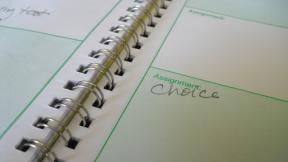
The following budget form is largely based on information from a pre-marriage program developed for married Muslim couples by Muslim counselor Shahina Siddiqui, executive director of the Winnipeg, Canada-based Islamic Social Services Association (ISSA).
The Sakrs have had enough of living paycheck to paycheck and they want to start planning how they spend their money. They are a family of five: Mr. Sakr (the dad), Mrs. Khadr (the mom), Aneesa (7 year old daughter), Ameen (5 year old son) and Alia (2 year old daughter).
1. They first determine their family income:
Mr. Sakr is the main supporter of the family. He earns $50,000 a year (after taxes).
Mrs. Khadr works part-time and has generously agreed to devote her salary to her family (although she is not obligated to Islamically). She earns $10,000 per year (after taxes).
They have no other income.
Monthly income is $60,000 divided by 12=$5000.00
2. Then they have to list all of their expenses:
a. They subdivide this into three big categories: essential (what they need to survive), non-essential (what is not as necessary to survive) and savings.
For their family, the essential categories are
food
house
clothing
debts
utilities
credit card expenses
utilities
medical
dental
car and transportation
education
medical insurance
dental insurance
personal insurance
Under non-essentials, they have:
entertainment/recreation
gifts and charitable donations
savings
The essentials are usually easier to do if there is a set amount that must be given monthly or weekly, like rent, which is paid monthly.
If the figure is yearly, they simply take the figure and divide it by 12 to get the monthly average. For example, Aneesa and Ameen's Islamic school fees are paid at the beginning of the school year. The fee is $5,000 per student. In the Sakrs case, what they would do is take $10,000 and divide by 12 (which comes out to $833.33 per month on school fees).
b. each of the categories are then subdivided more specifically
Essentials:
Food
groceries....................................$300.00
(bulk Halal meat)..........................$ 80.00
House payments
-insurance...................................$100.00
-rent /payments.......................... $750.00
-taxes........................................$100.00
-furniture....................................$ 50.00
Utilities
-heating......................................$ 60.00
-hot water...................................$100.00
-gas..........................................$ 50.00
-basic telephone service....................$ 25.00
-internet access..............................$ 20.00
Clothing......................................$100.00
Household expenses
-household repairs...........................$ 50.00
-laundry bill..................................$ 75.00
-laundry detergent, etc.....................$ 20.00
-dry cleaning.................................$ 20.00
Credit card expenses
-MasterCard...................................$50.00
-VISA..........................................$50.00
Debts
-student loans................................$65.00
Zakah
-check with an Islamic scholar what the right formula would be. But keep this category here so that you remember you must pay Zakah
The Car and transportation
-insurance.....................................$100.00
-car payments.................................$ 75.00
-car maintenance...............................$50.00
-car operation-gas.............................$50.00
-parking (at Mr. Sakr's office)...............$30.00
-bus fare or school bus......................$200.00
Medical
-pharmaceutical................................$20.00
-Insurance.....................................$100.00
-expenses.....................................$100.00
Dental
-insurance......................................$50.00
-expenses......................................$50.00
personal insurance
since they are living in an apartment......$100.00
the Sakr have to pay this
Education expenses
for Aneesa and Ameen's Islamic school fees $833.33
registration for Islamic conferences.........$50.00
books for a home library.....................$20.00
school supplies................................$30.00
Grooming
-personal grooming things..................$100.00
(i.e. shampoo, soap, toilet paper)
_________________________________________
TOTAL FOR ESSENTIALS............ $3973.33
What is left for non-essentials then is:....$5000.00
.............................................. -$3973.33
_________________________________________
................................................$1026.67
Non-essentials
Entertainment/recreation
-fees for Ameen's hockey...................$70.00
-fees for Aneesa's painting lessons.........$80.00
-eating out twice a month...................$100.00
-memberships (YMCA)......................$50.00
-school trips..................................$ 50.00
-guests-dinner parties........................$100.00
Gifts and Donations to Islamic charities (Sadaqa)
- to the local mosque........................$200.00
-&Sound Vision Foundation)...............$50.00
-personal gifts (weddings, etc.)...........$100.00
_________________________________________________________
TOTAL FOR NON-ESSENTIALS......$620.00
$ 1026.67
- $ 620.00
_____________
$406.67-This money must go into savings and investments
Savings/Investments
-emergencies.............................$200.00
-kids college education fund...........$100.00
-to buy home without interest..........$100.00
___________________________________________________________
TOTAL SAVINGS......................$400.00
*You can give the $0.67 to charity, Insha Allah.
Some other budget tips
- See a chartered accountant and go over the budget with them. They can help you identify areas where you can save.
- Be on the lookout on how you can save to put more into your savings and investments. It does not have to be a drastic step. Changing shampoo or detergent brands, reducing the clothing budget to the essentials, these are some ways you can cut costs.
- Be flexible. Having a budget does not mean rigidly setting aside exact proportions always. If for instance, one month, the laundry machine is broken but the kids need new winter boots, the kids boots take priority, and the laundry machine will have to wait. You can get your laundry done at the local laundromat.
- Have everybody in on the budget depending on their age. Encourage kids to see ways they can cut costs in their activities or recreation, for instance. Or encourage mom to take up walking instead of paying a lot of money to join an all-women's swim club if it's getting too expensive. Encourage dad to cut television viewing by cutting off cable.
Photo Attribution: http://commons.wikimedia.org/wiki/File:Dollar_bill,_small_change_and_ring._Wellcome_L0043996.jpg








Comments
very helpful side.
Location
Pages
Add new comment